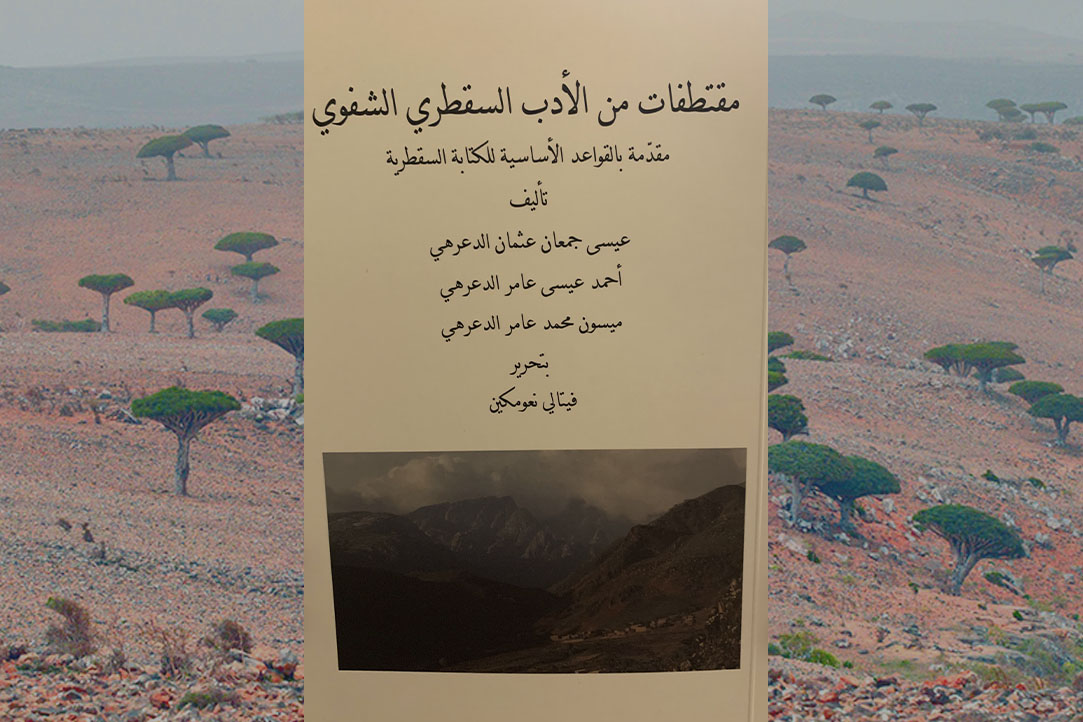First Book in Soqotri Published in Conjunction with HSE IOCS

November 25, 2021 marked the publishing of a corpus of Soqotri folklore texts. Translated into Classical Arabic, the texts are accompanied by a brief introduction explaining the basic principles of the Soqotri writing system, which is based on the Arabic orthography. The authors of the book are Soqotri native speakers Ahmed Isa al-Daarhi, Isa Gumaan al-Daarhi, and Maysoon Mohammed Aldarhi. It was published by Maria Bulakh and Leonid Kogan under the editorship of Prof. Vitaly Naumkin, Corresponding Member of the Russian Academy of Sciences. The publication was supported by the UAE Embassy in Moscow.
The Soqotri language is one of the Semitic languages spoken by the Soqotri people on the island of Socotra in the Arabian Sea. The languages closest to Soqotri are Mehri and Shehri, which are spoken in Yemen Mehri and Oman Dhofar. These languages form a special language group called the Modern South Arabian languages (MSAL). All of them, particularly Soqotri, are extremely archaic languages that preserve many grammar and lexical features lost by other Semitic languages.
Until recently, the Soqotri language had no written history and was not taught at the island’s schools or higher education institutions. Although the first attempts to write down Soqotri words, phrases, and texts using Arabic letters date back to the first half of the 19th century, no comprehensive writing system for the Soqotri language was developed until the turn of the 21st century. It has become clear that a standardized writing system based on the Arabic alphabet and using modern linguistic methods and a certain set of orthographic rules is necessary to preserve and develop the language as an integral part of the Soqotran identity.
The publication uses the Soqotri writing system developed by a team of researchers, including both indigenous Soqotrans (Isa Gumaan al-Daarhi, Ahmed Isa al-Daarhi) and Russian linguists (Maria Bulakh, Leonid Kogan, Dmitry Cherkashin). The project to create the Soqotri written language was led by Prof. Vitaly Naumkin, an outstanding Russian Arabiс and Islamic scholar and a pioneer in the study of the Soqotri culture and language.
The first volume of the Corpus of Soqotri Oral Literature (SCOL), published by Brill (Netherlands) in 2014, was a major publication that successfully applied the developed alphabet. The book comprises 30 carefully commented Soqotran works from various genres with translations into literary Arabic and English. It presents Soqotran texts in two versions—a Latin-based linguistic transcript and the new Soqotran script based on the Arabic system. The second volume of the Corpus (which is organized in a similar fashion) was published in 2018. The third volume of CSOL is expected to be published in 2022.
The publication covers only a small part of Soqotri folklore heritage, both in terms of prose and poetry. The main purpose of the book is twofold. First, it is aimed at encouraging the development and dissemination of written culture on the island using a specially developed system based on the Arabic alphabet. Second, the book presents outstanding examples of traditional Soqotri literature to interested Arabic readers.
The book includes selected stories and poems from the three Corpuses of Soqotri Oral Literature (CSOL). Most of them are recited by Isa Gumaan al-Daarhi, Ahmed Isa al-Daarhi, Maysoon Mohammed al-Daarhi, and senior members of the Daarhi tribe: sheikh Isa Amer al-Daarhi and the late sheikh Amer Ahmed al-Daarhi.
Such efforts to create a writing system for the Soqotri language will give new generations of Soqotri people the opportunity to learn their mother tongue using comprehensive printed manuals and to publish Soqotri texts in a variety of media (including online).
Maria Bulakh
Associate Professor, Institute for Oriental and Classical Studies
Leonid Kogan
Professor, Institute for Oriental and Classical Studies
Vitaly Naumkin
Professor, Joint Department with RAS Institute of Oriental Studies

